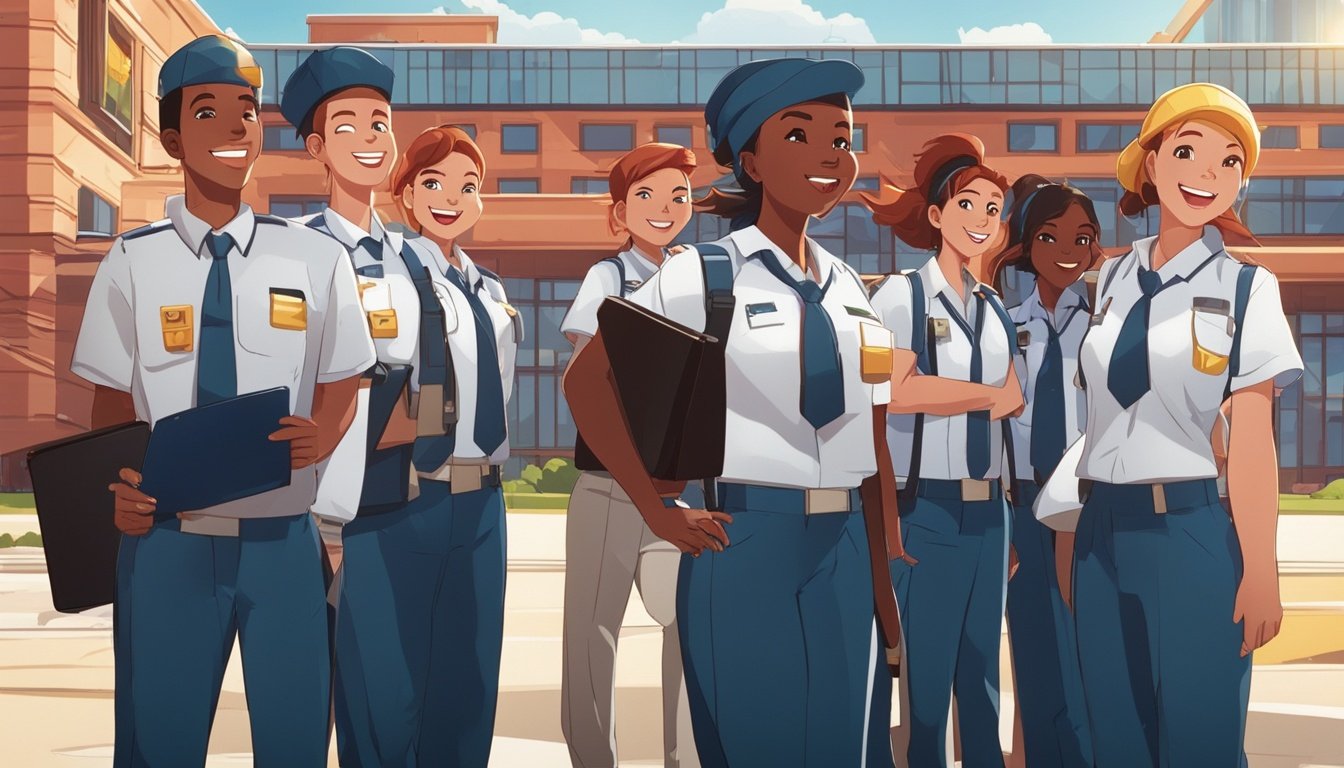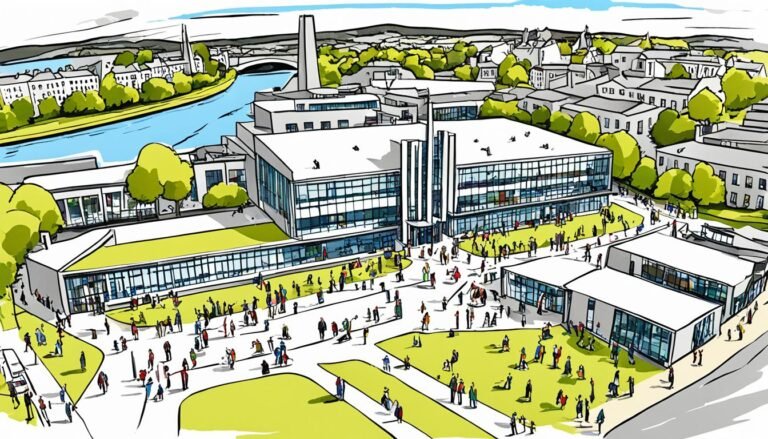From Classroom to Career: Navigating Ireland’s Trade Schools
Have you ever thought about if traditional school is the only way to make it in today’s fast-changing job world? Ireland is now embracing new ways of learning, making trade schools a great choice for many students. These schools teach you the skills you need for different jobs. They’re becoming more popular because they offer programs that match what employers want.
In this article, we’ll look at how trade schools help you move from school to a real career. They connect classroom learning with real-world skills.
Key Takeaways
- Trade schools provide practical skills tailored to industry needs.
- They offer a viable alternative to traditional universities.
- The focus on vocational education enhances job readiness.
- Hands-on learning experiences are integral to trade school curriculums.
- Students can expect diverse career pathways post-graduation.
- Apprenticeships play a crucial role in professional development.
Understanding the Role of Trade Schools in Ireland
Trade schools are key in Ireland’s education scene. They offer focused training for specific careers in trades. These schools prepare students for the labor market with practical skills.
Students get hands-on training to excel in their chosen careers. This approach helps them gain the skills needed for success.
Importance of Vocational Education
Vocational education is crucial for economic growth. It produces skilled workers ready for the job market. Programs are short, lasting from 8 to 18 months.
This means students can start working sooner than those in traditional universities. They can earn $10 to $15 an hour right away. With experience, they can make $20 to $25 an hour.
Trade Schools vs. Traditional Universities
Trade schools focus on key skills for certain jobs. Students can study automotive services, HVAC, and more. This is different from traditional universities, which offer a wider range of subjects.
College graduates in fields like IT Security or engineering can earn more. They might make twice as much as trade school graduates. Each path has its own benefits, fitting different career goals and life situations.
Types of Programs Available in Ireland’s Trade Schools
Irish trade schools have many programs to help students get the skills they need for their careers. These trade school programs meet the high demand for skilled workers in different fields. They make sure graduates are ready to do well in their jobs.
Skilled Trades Offered
Students can choose from skilled trades like:
- Plumbing
- Electrical work
- Carpentry
- Welding
- Automotive repair
These programs are at NFQ Levels 5 and 6. They last one to two years. They give students the full training they need for their jobs.
Technical Institutes and Their Specializations
Technical institutes are key in vocational education. They offer courses in technology and engineering. These courses prepare students with trade school programs that match what the market needs. For example, students can take:
- Specific Skills Training (SST): These six-month courses are for specific industry needs.
- Traineeships: These last 4-9 months and end with recognized qualifications.
- Foundation courses: These courses get learners ready for labor market-led qualifications.
These programs make sure graduates know their fields well. They also help them adapt to the changing job market.
The Benefits of Participating in Vocational Education
Vocational education has many benefits, especially for getting ready for the job market. As jobs change, it’s more important than ever to be prepared. Trade schools help by teaching students the skills needed today.
Job Readiness and Industry Demand
Vocational education focuses on practical training, making graduates more job-ready. Studies show that those with vocational training are 2.2% more likely to get a job than those without. They learn skills that are used right away in many fields, helping to fill skill gaps.
This makes their training very valuable to employers and job seekers alike.
Hands-On Learning Experience
Trade schools offer a hands-on way of learning. Students take part in simulations, workshops, and real work settings. This approach helps them understand the industry better and builds their confidence.
They learn both the theory and the practical skills needed for their careers. This makes them more likely to succeed in their chosen fields.
What to Expect from Trade School Curriculum
Going to a trade school means getting a structured education that goes hand in hand with practical learning. Students will find a detailed curriculum that prepares them for certain careers. This path combines classroom learning with real-world skills, leading to certifications that show they’re ready for their job.
Curriculum Structure and Duration
Trade school programs usually last from a few months to two years, based on the trade you choose. Students will learn both theory and practical skills. The curriculum includes:
- Core subjects relevant to the trade.
- Technical skills development.
- Safety protocols and regulations.
- Hands-on projects and internships.
This structured way of learning makes sure graduates are ready for the job. They can meet the needs of employers well.
Assessment and Certification Process
Trade schools use both written tests and practical tests to check students’ skills. These tests make sure students fully understand the trade. Passing these tests lets students get certifications. These certifications are key for getting a job, as many employers want to see proof of skills.
Career Pathways Available After Trade School
After finishing trade school, graduates have many career paths to follow. They can go into skilled trades or technical jobs, which are both rewarding. With industries growing, there’s a big need for skilled workers. This means lots of job chances for those with vocational training.
Potential Job Opportunities in Various Fields
Trade school graduates can find work in many in-demand areas:
- Advanced Manufacturing: Prepares students for careers in manufacturing and aerospace industries.
- Business and Communication: Equips individuals for roles in professional business environments or the multimedia field.
- Education and Public Safety: Focuses on preparing individuals for careers in early childhood education and public safety professions.
- Health Sciences: Allows students to enter various healthcare professions, such as licensed practical nurses, dental assistants, and occupational therapy assistants.
- Transportation and Trades: Prepares individuals for careers in vehicle repair and marine equipment, while earning industry certifications and apprenticeship hours.
Also, over 70 Career & Technical Education (CTE) programs are in high schools. These programs let students check out different career paths while they’re still in school. The Job Corps program also helps young adults aged 16-24 with free education and job training.
Supporting Industry Collaboration
Working together with industries is key for trade school graduates’ career success. Trade schools and employers team up for things like internships, workshops, and career fairs. These events help students find jobs in fields that need workers.
For example, groups like the Northern Nevada Apprenticeship Coordinators’ Association offer paid training in important areas like construction and electrical work. TMCC’s Applied Technologies Department trains students in automotive mechanics, HVAC/R repair, and welding. This prepares them for good-paying jobs.
Focus on working with industries makes sure graduates are ready for the job market. This link between school and work gives them the skills they need. It sets a strong base for their career paths.
Apprenticeships: A Stepping Stone to Success
Apprenticeships are key in linking classroom learning with real-world skills. They let students learn by doing, under the guidance of experts. This approach helps people earn as they learn, making their career path smoother.
How Apprenticeships Work
Apprenticeships last from two to four years and lead to National Framework of Qualifications (NFQ) Awards. From 25 programs in 2014 to 66 in 2022, their popularity has grown. Now, fields like BioPharma, Engineering, and Crafts offer more apprenticeship chances.
Benefits of Apprenticeship Programs
Being in an apprenticeship brings many perks, including:
- Earning while learning: Apprentices get paid while they train.
- Skill acquisition: They learn skills that employers want.
- Employment opportunities: Many apprentices get jobs with their training employers later.
Over 8,600 people started apprenticeships in 2021, showing their appeal. This mix of training and work experience boosts career growth and job satisfaction in skilled trades and technical fields.
How to Choose the Right Trade School for You
Choosing the right trade school is key to your career success. You’ll want to look at things like program options, if the school is accredited, and if it has industry ties. Doing your homework can lead you to the perfect school for your goals.
Factors to Consider When Selecting a School
- Program Offerings: Look for schools with programs that fit your career goals, like automotive, welding, or medical assistance. For example, Universal Technical Institute (UTI) offers programs that can be finished in 18 months or less.
- Accreditation: Make sure the school is accredited. This means your degree will be recognized in the job world. UTI is approved by the Illinois Board of Higher Education, for instance.
- Industry Relationships: Schools with ties to industry brands can make your training better. UTI works with over 35 brands to design its programs.
- Job Placement Rates: Check how well graduates find jobs after school. A high rate means the school does a great job preparing students for the workforce.
Researching Schools and Programs Effectively
Here are some tips for researching trade schools:
- Utilize Online Resources: Use websites like the Vocational Schools Database and the Council for Higher Accreditation to find trustworthy info on schools and programs.
- Attend Information Sessions: Go to open houses or info sessions to learn more about the school and what it offers.
- Seek Recommendations: Talk to current students and alumni to hear about their experiences and how the school helped them in their careers.
- Evaluate Financial Aid Options: Look into financial aid options. UTI has a team dedicated to helping with funding and scholarships.
From Classroom to Career: Navigating Ireland’s Trade Schools
Trade school graduates share stories of how vocational education changed their lives in Ireland. These stories show the many ways people find professional success. They prove how practical training greatly impacts their career paths.
Success Stories of Trade School Graduates
Alumni from trade schools tell stories of how their education helped them in their careers. Many moved into respected positions in various fields, thanks to their vocational training. Their stories often focus on entering skilled trades like plumbing, electrical work, or carpentry, showing the strong demand for these jobs.
Some graduates also used their training to succeed in tech and healthcare. Their stories highlight the value of hands-on learning. This type of learning prepares students for real-world challenges, builds important skills, and boosts their confidence.
With support from graduate programs in different sectors, many former students have found more opportunities for growth. These programs provide detailed training vital for success in today’s competitive job market. Guidance helps graduates recognize their strengths and find their place in their chosen fields.
Conclusion
Vocational education is key to Ireland’s future workforce. Trade schools offer a direct path to promising careers. They bridge the gap between school and the skills employers want.
Trade schools in Ireland prepare students for real-world challenges. They make students ready for the job market. This is more than just learning; it’s about getting ready for the future.
The need for skilled workers keeps growing. Trade schools meet this need by offering diverse programs. These programs give students the skills and qualifications needed in many industries.
Students gain valuable credentials through vocational education. These credentials are in high demand in today’s job market. This leads to great career opportunities.
It’s important to spread the word about vocational education. More people should know about the benefits of trade schools in Ireland. This can help the economy grow.
By focusing on lifelong learning and upskilling, Ireland can grow in many areas. This will help drive the country forward in a changing world.
Source Links
- Overview of the Irish education system
- Navigating difficult waters: learning for career and labour market transitions
- Is it possible to attend trade school and college?
- Navigating the Data Science Landscape: Ireland’s Academic Odyssey
- time – FET Course Hub
- What classes are needed/required for becoming a teacher? What skills are needed/required?
- untitled
- The effects of vocational education on adult skills, employment and wages: What can we learn from PIAAC? – SERIEs
- 13 Questions to Answer When Choosing a Trade School
- Career and Technical Education – Pawtucket School Department
- Career & Technical Education (CTE) / Career & Technical Education (CTE) Home
- Career Pathways – BatesTech
- College & Career Center / CTE / Trade Options
- Earn While You Learn | UVA HR
- Further Education & Training: The Future Is What You Make It
- What Is a Trade School & Is It Right for You? | UTI
- College & Career Center / Vocational/ Trade School
- Navigating graduate recruitment programmes: Quality over quantity
- Progressing a Unified Tertiary System for Learning, Skills and Knowledge
- Improving well-being at school – Democratic Schools for All – www.coe.int








